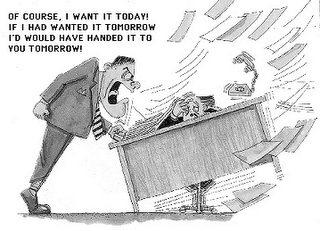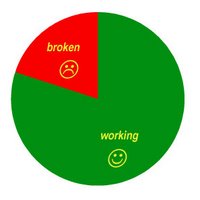
All the best!
wcdixon




"A show on the bubble is a bit like a high school romance," said Hart Hanson, one of the show's executive producers. "We're the girl going out with the quarterback, and he's always looking for the next cheerleader. We have to wonder how long he's going to go out with us. If we do everything he says, he won't respect us, and if we do nothing he says, he won't respect us either."
Today’s reality is most TV series are on the bubble. Why? Because there are very few bone fide hit TV series on the air, and the 'no touchy' showrunners (as in “no touchy my scripts”) are few and far between (though John August seems to think 'Heroes' has that privilege). Most shows are struggling...just trying to run far enough ahead of the bear to live another season.
Sidebar 2: Far too many networks and execs, in my opinion, cling to the numbers/ratings of several years ago as the benchmarks of 'where a show needs to be to be a hit.” As a result the Execs are unfairly down on a show after only a few airings. This goes for Canada as well. Not every show can have the freaky ratings like the Idol franchise. The bar needs to be lowered or adjusted somehow.
Back on the highway again. Since few shows are deemed 'hits', you constantly have execs and networks trying to make your show into a winner. I remember one network exec started off every big note session with..."Here I am to save the day!" Talk about a surefire line to put your story department on the defensive and/or feeling inadequate. But when you don’t have a hit, it's tough as a showrunner or head of the story department to defend or rebuff the exec’s notes.
"I need to see it."
Add to the equation the illusion in Exec land that a script/story isn't real until it's in prep and about to go to camera. I once heard a network exec ask when the draft in his hands started shooting...and when he was told 'next week,' he actually replied: "Okay...time to get serious with my notes." Whaaaa?! What were all the suggestions and comments on the outline and first draft? Him just goofing around?

Because believe me...if you write it, the notes will come.
Sidebar 3: I've worked with a few golden boys - Rob C Cooper (Stargate SG:1) is one of them. I remember after an hour long phone debate and haggle with the network over one scene and a couple of lines of dialogue (none of it was dealbreaker stuff, just choices...scene point of view, etc.), Rob said that he'd love to sit down all the company and network execs on a Saturday night as the show airs and show them how fast the scene flies by. How all the minutiae of what’s being debated ultimately don’t affect the characters or overall story. He said he hoped this little exercise would enlighten them enough to exclaim: “We spent an hour debating that? What were we thinking?!" Then he thought about it a second, sighed, and says: "Probably wouldn't matter. Fuckers."
But I don't want to give the impression that all company or studio or network execs are idiots, not at all. Most are very smart driven creative people with good ideas. And their schedules can get jammed up like ours in production can. And most times they don't really have as big a problem with the script/story as their notes would suggest...it's just that they are being driven by this need to make it a hit (since its not). And hits must warrant drastic change, right? But unfortunately, when you combine the 'we need to get the numbers up' with the psychological aspect of the exec who only notes seriously when the episode is heading into prep or production, you can be faced with the task of moving music boxes. "Could we try the piano over there, hun...?"
Where am I going with all this? A while back, DMc asked:
Hey Will: you know the whole tendency that others have remarked upon that most scripts go one revision past where they were really great, and at their best. Have you encountered any way, tricks or tips to keep that from happening?Well...yes, there are some ways to keep it from happening, at least somewhat.
Like most second-year shows that didn't blow up the Nielsen ratings, "Supernatural" has undergone a creative back-and-forth with both the network and the studio in a bid to draw the largest possible audience. Eric Kripke, the show's creator and an executive producer, described the process last season with the now-defunct WB as "fairly amicable" but admits it was not without its tensions.I can only speak from my experience, and I'm not advocating this as being the way to go, but I know and understand of which Kripke speaks. And I fully endorse exploiting that advantage to its fullest.
The show's creative team and the network clashed over scripts and story lines. Sometimes the creative team backed down, and other times they found even more "creative" ways around the impasse.
"The huge advantage any TV producer has on their side is the breakneck schedule, and I'll fully own up to taking great advantage of that a time or two," Kripke said. "If we pulled the script for the [network's] story suggestions, that means shutting down production. There's not any time for that, so we'd have to move forward."





"Doing a movie or a play is like running a marathon. Doing a television show is like running until you die." -- David MametI get what Mamet is saying here, but don’t agree with him a hundred percent. Doing a TV series can also be like running a marathon...if you adopt the 80% Solution.

 80% is a great target to aim for under those kinds of circumstances - a nice manageable target of accomplishment. If your goal is always a hundred percent perfection, you'll kill yourself, or kill the series, or both. And you'll always be unhappy or unsatisfied if you expect that much of yourself or your crew. Maybe you can expect more on a movie, because it's a one time deal, but a series isn't one show...it's a season of many shows. The series is king, not an episode.
80% is a great target to aim for under those kinds of circumstances - a nice manageable target of accomplishment. If your goal is always a hundred percent perfection, you'll kill yourself, or kill the series, or both. And you'll always be unhappy or unsatisfied if you expect that much of yourself or your crew. Maybe you can expect more on a movie, because it's a one time deal, but a series isn't one show...it's a season of many shows. The series is king, not an episode.SONG&ARTIST? - "Jackboots, hi-jacks
Ray guns and spray guns
We got them all for free
Look to the stars for consolation
It could be there lookin' at me
It could be there lookin' at me
Send me down a simple solution
Send me down a simple solution now."
In fact, why is the AMPTP negotiating with anyone? The Screen Actors Guild, the Directors Guild, any of the 80 industry-wide collective bargaining agreements it handles.
The issue is not that these AMPTP companies are part of multinational corporations...it's that they are competitors with one another.
Before anyone tries to answer the question, hold off a moment as this is put into a larger perspective.
Imagine the auto industry for a moment.
The AMPTP is like if General Motors, Ford, Daimler-Chrysler, Toyota, Honda and Nissan all got together, decided the terms they would offer employees, and then negotiated as a single body against one isolated division of U.S. auto workers at a time. Divide and conquer. Take it or leave it.
It's not that it would be massively illegal. It's that it would be unconscionable. No one in the aghast free world would stand for it. Even Luddites who wished it wasn't illegal understand why it's unacceptable.
Competitors are not allowed to negotiate together, to even confer together. It's called collusion. When baseball owners merely created an "information bank" for offers being made to free agent players, they were fined $280 million. Two competitors cannot talk with one another if there's just a hint of agreement. Imagine ALL competitors in an industry getting together to set ALL wages and ALL labor conditions.
It doesn't happen. Anywhere. Not "anywhere in the U.S." Anywhere in the free world.
Except Hollywood.

With the strike squeezing off the pilot script pipeline, CBS is turning to feature film scripts in a bid to find potential material for new series.
Eye entertainment prexy Nina Tassler has been personally calling a number of film producers and asking them to dust off any unproduced scripts that could be turned into TV series, according to two people familiar with the situation. These projects are already fully written but have either been put into turnaround or simply never got off the ground.
Because most movies tend to run around two hours in length, Tassler isn't looking to produce the full scripts. Instead, she's asking producers to identify key scenes or passages that could be filmed and cobbled together into a pilot or shorter pilot
presentation.
Tassler isn't calling any WGA members, since scribes are prohibited from pitching ideas or negotiating with struck companies.

 Wow.
Wow.
But not without some research. Weeks of looking at 8 bit vs. 10 bit video processors and 720p or 1080i vs. 1080p comparisons not to mention 60hz vs. 120hz frame rate analysis finally resulted in a purchase, and Sony won out again.
I can play with madness.
I remember when I made my first high end TV/media purchase. The year was 1990 and I dived in deep with a 27" Sony XBR and a 4 head Sony VCR. The two didn't come cheap. The TV cost $2,700.00. The VCR was $600.00. That's $3,300.00. Plus taxes. Gulp.
But what a sight to behold...they so put my 20" Citizen Television and top loading JVC VCR to shame.
That said, a similar-sized LCD High-Def Sony TV and a discounted Blu-Ray Player today...under a thousand bucks. Taxes in. Throw in the digital HD cable box with built-in PVR, and no hernia carrying the boxes from car to house...triple threat.
And the experience of viewing your favourite movie or TV show in sparkling 1080p? Sweet. Oh so sweet.
But will these new entertainment display units be dependable and last? One upside of my old Sony was that it made it through three cross country moves with several unintentional drops, bumps, and bashes, and was still ticking last year before some tube or circuit crapped out and I didn't bother repairing it. Better still was it's remote control. A tank of a hand unit, all the buttons still worked and numbers still visible, even after fifteen years of constant use. I know of two friends TV's bought in the past couple years that already have scotch tape over the battery holder and the number 3 is caput.
So we shall see.
And will I ever be able to watch analog or SD (Standard Def) channels again? My friends who'd already gone HD who warned me that they (and therefore I) can't go back. And I will admit throwing up a bit in my mouth on Saturday after flipping to the Golf Channel after just enjoying the Leafs beat the Penguins on CBC HD.
Come on 2009 (or is it 2010?)!
This article from MediaPost lists the U.S. channels actually available today, plus the hype (or lack thereof) of what's to come.
As for the future, can the images get any better, sharper, crisper? Oh, probably. But there's one thing we do know for sure....they will get cheaper. The price of the one I got has already dropped, just in time for Xmas.
Sigh.

Canadian TV and film writers joined writers in Paris, London, Berlin and other entertainment centres around the world in a show of support for their U.S. colleagues.
"As Canadian writers, what happens in the U.S. desperately affects us," said Denis McGrath, a Canadian screenwriter picketing outside Toronto's Sony Centre.
"We already make a lot less money than American writers do, and we still have it better than writers in other countries," he said. "So all around the world today, in six, seven cities around the world, different members of their national writers guilds are marching in solidarity with the WGA for their deal on internet rights."



Sometimes it's a matter of taking an event or a scene and moving it sooner, or later, or trimming it out. Move a single scene, and everything may fall into place.
All of these notes are really about the mechanics of the story: how the engine of the story works. It's the difference between a driver saying that the car tends to fishtail, and the engineer saying the center of mass of the car is too far forward.
These are the kinds of notes I most like to get because they make the fix easier. If you think the problem is that the car fishtails, your "reader" response is to drive the car more slowly around corners. Your "writer" response is to move the center of mass, or to throw on a spoiler to push the rear of the car down onto the road. Then your story corners nicely at high speed.
When someone asks you for feedback on a script, first ask what kind of feedback they want. Is this a very rough, early draft, and they’re still working on the structure? Or is is nearly finished, and they’re doing a last polish? This should guide, but not limit your note-giving.
If someone asks for small, final draft notes and you spot a huge plot hole, by all means, bring it up. But if they’re still working out story issues, don’t sweat the dialogue - it will probably change as the story does.



Marty Rosen (Producer): What's with you and 14 year old girls?
Bob Barrenger (Movie Star): Everybody needs a hobby.
In 1999, it was defensive back Terryl Ulmer, and cocaine trafficking. Defensive back Davin Bush was convicted of assault in an incident outside a nightclub in 2001; defensive lineman Shont'e Peoples was charged with marijuana possession in 2003; running back Saladin McCullough and receivers Jamel Richardson and Emery Beckles were charged with assault in 2004. And then came Smith.
That case was the storm, as the defensive lineman was charged and later convicted of having sex with two women despite knowing he was HIV positive. It turned out that the Riders had known Smith's medical status for more than a year, but had not only not disclosed it -- they were barred by medical privacy laws --but let him continue to play.
Smith was eventually sentenced to six years in prison. It was a betrayal of trust.
There were more incidents --a bar fight involving running back Kenton Keith, and an arrest for troubled running back Hakim Hill, who was released by the Riders last February.

Bob Barrenger: Only second chance I know, is the chance to make the same mistake twice.
Marty Rossen: If your memory was as long as your dick, you'd be in good shape.
And I found myself wondering: what's worse...the players that took advantage of their undeserved 'celebrity'? Or the townspeople who let 'celebrity' rule the roost?
This year, under new management, the Riders find themselves in the Grey Cup against Winnipeg. So congrats seem to be in order for an 'on the field' turnaround. As for off the field, it appears somewhat cleaned up by all accounts. But what's interesting is the call for change didn't seem to come from the fans, or even from the community (who actually own shares in the team). Unlike the town in State And Main, who eventually rise up and fight back with principles and morals and values and integrity to shame and show up the big movie in town, Regina and its Rider fans seem instead to have adopted some sort of a 'good or bad...we'll take whatever we get' attitude. And as for the teams tawdry recent past? It seems already forgotten.
Now, a few of my more reasonable friends who aren't so quick to forget, still claim that a Grey Cup victory this weekend should erase the embarrassment of the past decade and provide redemption for the ol' green and white. And at least on paper, the Riders should win. The Bluebombers are a decent squad but not a powerhouse, not to mention they lost their starting quarterback to a broken arm last week. The Riders are also beat up, but not to the same extent.
Nevertheless, I'll be pulling for Winnipeg on Sunday. Rider redemption shouldn't come so quick. Or be so easy.
Go, you Bombers.
Fifty three percent of 300 media, advertising and entertainment executives believe writers should continue to “hold out for everything they want,” with 47% voting for them to “pick up their pencils and get back to work.” According to the poll conducted by www.jackmyers.com, a slight majority of a group that should be expected to be more sympathetic to the networks and studios express support for the Writers Guild of America.
This surprising result suggests underlying acknowledgement that digital assets represent an important and growing revenue stream for the industry and, although it is impossible to assess the long-term incremental value represented by digital, writers indeed deserve a slice of the pie.
The ironic reality of the writers’ strike is its irrelevancy. Digital media is disrupting the economic models of an industry whose models have been broken for years. Today, fewer than one network television series in twelve breaks through to profitability. This one program in twelve has to support the enormous operating overhead of those who risk capital to develop and produce the programs. It is a business of failure, not success. The Writers Guild of America wants a piece of that American Dream — the ability to fail time and time and time again, and ultimately have a profitable business. Networks and studios prefer to hold onto their right to fail upward for as long as they can.
Writers are rewarded now for their failures; they want a bigger slice of the action in those rare instances they succeed. Whether the strike ends soon or continues into the new year, there’s a new business model in town.
In the post-strike digital world, thousands of concepts will be cheaply produced and scattered across the digital landscape, much of it by members of the unionized Hollywood community who are being disenfranchised by the established economic models. Broadband and mobile video Web sites will eagerly offer distribution for this content, and ad sales networks such as Broadband Enterprises and Tremor Media will help fund it through advertiser support. A few will find their way to cable and broadcast series that make up the best of the Web, and ultimately networks and studios will acquire development rights to the best, in a reversal of current windows. Studios and networks will increase their production of online content and significantly reduce their investment in script and pilot development.
At the end of the strike, whenever that is, writers will need to become more entrepreneurial if they hope to benefit from digital income. I can’t envision any scenario where writers get to simply sit and write and expect to benefit financially whether or not their scripts are ever developed.

The brand has risen remarkably with edgy creative and a marketing message to unleash your inner animal magnetism in a category where efficacy is normally the selling point. Axe has climbed the category by turning its back on other traditional tenets, eschewing sports tie-ins and programming; using online and content integration plays; and defining its competitive set not as deodorants but as PlayStation and Nike.
If the studios really believe they can't share a sliver of profits with the people who create what they sell, they'll be the losers. If you don't believe in the future, you shouldn't be in show business.Patrick Goldstein at the LA Times trying to get to the bottom of the AMPTP's reluctance to negotiate and be reasonable leaves him cold and confused....
$204,000 dollars....this number was chosen specifically because CNBC and the studios on whose behalf they're arguing want you to believe that most writers are spoiled brats whining about their six-figure incomes.Greg Saunders at the Huffington Post neatly explains the difference between 'average' salary (of WGA members) and 'median' salary, which is far more applicable...
If the writers' strike continues, and ultimately causes the collapse of the traditional TV development, pilot, upfront and fall season continuum, it would not necessarily be a bad thing for the industry.And MediaPost's Jack Myers theorizes and speculates about the bad, and the good, that can come from the strike...

British Columbia's television industry is in crisis as repercussions from the U.S. writers' strike make their way north. One show has already shut down and at least five more are expected to prematurely stop production in the coming months.
NBC's Bionic Woman, starring Michelle Ryan, was supposed to run through to Dec. 12, but it shut down last Friday, said veteran publicist Bill Vigars, whose Canadian production, Search and Rescue, is unaffected by the strike. Meanwhile, the fourth season of Battlestar Galactica is stopping production tomorrow, and will remain out of commission until further notice, because it ran out of scripts, a source close to the show said. At least 200 people will be laid off in the aftermath.
"It's a crisis," Mr. Vigars said. "Each one of those shows is probably [losing] 150 people," not including the ancillary industries that will be affected as a result.
Maureen Parker, executive director of the Writers Guild of Canada, said there have been a number of requests from Canadian writers living in the U.S. for a long time to come home to work on productions here.
But to do so, the Writers Guild of America requires Canadian writers to get a waiver of working rule No. 8, and they're not granting them at this time, Ms. Parker said.